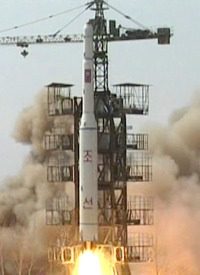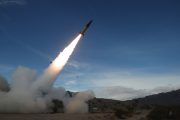
Despite several high-profile disagreements in recent years, outgoing Russian President Dmitry Medvedev praised the Obama administration, saying relations between the two governments had reached their “best level” in a decade. Obama, meanwhile, thanked Medvedev for his “cooperation” and said he could not have asked for a “better partner” in Russia.
"Going forward, we'll continue to seek discussions with Russia on a step we have never taken before — reducing not only our strategic nuclear warheads, but also tactical weapons and warheads in reserve," Obama said during a speech at South Korea’s Hankuk University of Foreign Studies. “We can already say with confidence that we have more nuclear weapons than we need.”
Shortly after taking office, Obama vowed to pursue a “world without nuclear weapons,” drawing praise from anti-nuclear activists but criticism from a broad range of others. And in 2010, the administration convinced the U.S. Senate to ratify the highly controversial new Strategic Arms Reduction Treaty (START) with the Russian government. The treaty, which cut nuclear stockpiles by one third, was hailed as Obama’s first major foreign policy achievement.
At the time, outraged American critics complained that the deal significantly weakened U.S. national defense capabilities and further eroded national sovereignty. But as Russian President-elect Vladimir Putin prepares to take office again, Obama is again demanding deeper cuts.
"I’m confident that, working together, we can continue to make progress and reduce our nuclear stockpiles,” the President told students during his speech. “Of course, we’ll consult closely with our allies every step of the way, because the security and defense of our allies, both in Europe and Asia, is not negotiable."
Obama also tried to use emotional appeals while framing the issue as a “moral” imperative. "I believe the United States has a unique responsibility to act — indeed, we have a moral obligation," he claimed. "I say this as President of the only nation ever to use nuclear weapons. I say it as a Commander-in-Chief who knows that our nuclear codes are never far from my side. Most of all, I say it as a father, who wants my two young daughters to grow up in a world where everything they know and love can't be instantly wiped out."
Despite Obama and Medvedev patting each other on the back, the meetings come at a time of increasing tensions. In Syria, for example, the U.S. government, Western leaders, al-Qaeda, and a collection of Middle Eastern dictatorships are backing a coalition of armed rebels seeking to overthrow “President” Bashir al-Assad. The Russian government, meanwhile, has reportedly been funneling arms to the Syrian regime.
But Medvedev said Russia supports peace in Syria, arguing only that another international “regime change” operation modeled after the blood-drenched NATO fiasco in Libya was not the way to achieve it. “We together with the U.S. president maintain that [former UN boss Kofi Annan’s recent mission to Damascus] is a good way to reach at least an initial point of settlement and open the road for communication between various groups of society in Syria,” he was quoted as saying by Reuters.
Russian authorities are also upset with the U.S. government over a planned “missile shield” to be erected close to Russia’s borders. The controversy became so serious that it even led senior Russian officials to threaten American military forces’ supply routes into Afghanistan. Throughout the meetings and speeches in Seoul, however, both Presidents consistently expressed warm feelings for one another.
During his speech, Obama also took time to attack the North Korean and Iranian regimes — particularly their nuclear programs. Speaking of Iran earlier in the day, the President renewed his threats against the nation over its alleged weapons program despite the fact that the U.S. intelligence community does not believe the Islamic dictatorship is even pursuing nuclear missiles. “Time is short,” he warned.
Obama also promised not to continue rewarding the communist dictatorship ruling North Korea with more American tax dollars every time it makes threats or provocations. He also asked the communist regime controlling mainland China to seek more negotiations with its murderous ally in Pyongyang.
Republican lawmakers have recently criticized the President for offering the regime more aid, calling it “appeasement.” The North Korean dictatorship, meanwhile, is planning to launch a rocket that it claims will deliver a satellite into space. But experts say it could be another ballistic missile test.
Support for further U.S. nuclear-arms reductions in the Senate is expected to be low. And Obama’s goal of a potential 80-percent reduction in deployed American nuclear weapons is unlikely to materialize any time soon, according to analysts.
Ahead of the Nuclear Security Summit in Seoul on Monday — which brings together some 50 global leaders — Obama praised the “international community” for making progress securing nuclear material over the last two years. The President’s critics, however, have continued to ridicule and condemn his efforts to disarm America.
Related articles:
Obama and Medvedev Sign Arms Treaty
Russia Threatens to Kill NATO War in Afghanistan
Obama and Clinton Push START Nuclear Treaty
Russia, China Block UN Vote on Syria Regime Change
North Korea Breaks Nuclear Agreement
Putin Recharged: What Now for Russia — and the World?
WikiLeaks Evidence: Russia Sponsoring Islamic Terror
U.S. Intelligence: No Evidence Iran Building Nukes
Facing Sanctions, Iran to Sideline Dollar by Using Gold in Trade
Photo: AP Images



